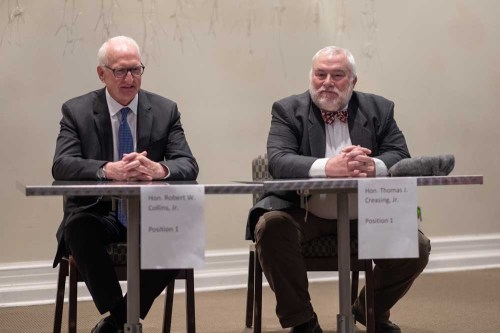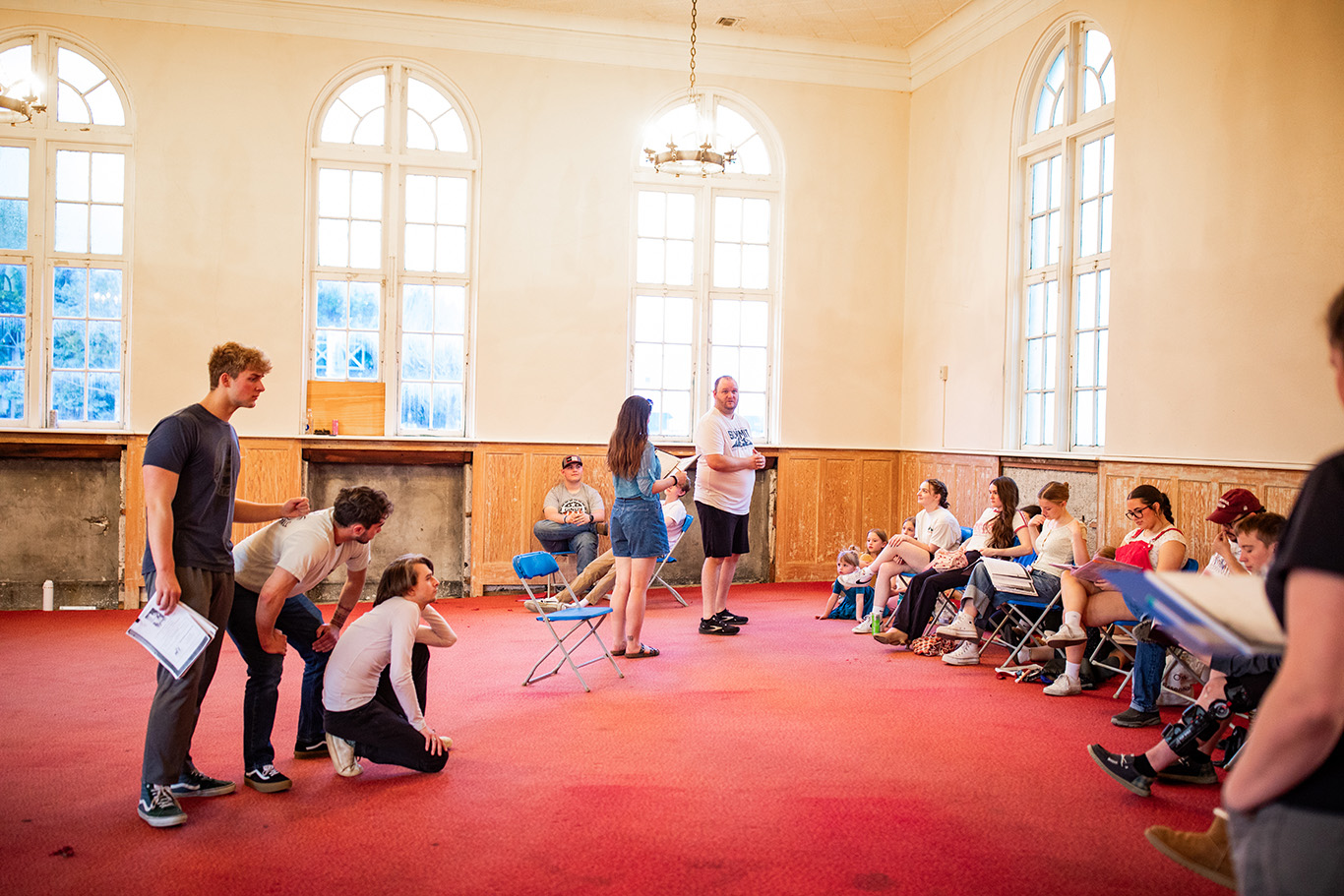Collins and Creasing vie for local circuit court seat
Published 5:15 am Sunday, April 21, 2024

- Circuit Judge Robert Collins Jr., left, and Irrigon Municipal Court Judge Thomas J. Creasing Jr. answer questions April 19, 2024, at a forum for local circuit court candidates at the Pendleton Center for the Arts. Voters on May 21 reelected Collins.
PENDLETON — Incumbent Circuit Judge Robert Collins Jr. said now is not the time for voters in Umatilla and Morrow counties to elect more than one new judge to the bench.
Collins is running for a second six-year term in Position 1 in the 6th Judicial District and faces a challenge from Thomas Creasing Jr., the municipal judge in Irrigon. The two participated in a forum Friday night, April 19, for local circuit judge candidates, along with candidates seeking the open Position 5 seat.
Circuit Judge Eva Temple also participated. She is running unopposed for a third term for Position 4.
The local bar association hosted the forum, and Kit Morgan, president of the bar for the district, moderated it. Around 20 people attended the forum, which took place at the Pendleton Center for the Arts and allowed the audience to ask questions.
Collins told the crowd he believes he’s done a good job in his six years as a judge. He said there is “a significant learning curve” as a new judge, and with a large backlog of cases after the pandemic, he did not think it would be a good idea to have more than one new judge.
Creasing has been a municipal judge in Irrigon for about two years, and before that he was the municipal judge in Hermiston for 12 years. He said part of his inspiration for running is because he believes people shouldn’t run for positions unopposed in a democracy. He said it’s important to him to embody what it means to be a public servant, which means seeing people in court beyond their file numbers.
Creasing said helping people get back on track with their lives has been the most important thing he’s done as a municipal judge and illustrated that with a story about how he helped a woman get her driver’s license back after years of it being suspended.
He said curiosity has been most important for him.
“What do I do to make this situation in front of me better? How can I fix this? How can I keep this person from coming back?” he said. “I think my curiosity, above and beyond everything, has been the best thing for me on the bench.”
Collins said patience is the quality he believes is most important on the bench. He said patience helps him listen intently to people in his courtroom and understand their meaning accurately.
Collins said the most impactful case he ruled on as a judge has been one involving an incarcerated man with medical needs the Oregon Department of Corrections failed to meet, and his decision sent a message to the DOC. It was a case that made him uncomfortable at the time, he said, but it ended up being important because of the wider impact.
On a question about doing more locally on drug use and addiction issues, Collins said as a judge he has to rely on the public resources available, so if people who are homeless are trying to get clean but don’t have a place to live, it makes it that much harder for them to be successful. A lack of public resources, such as housing, can limit judges’ ability to help, he said.
The downstream support must be available, Creasing said. While the court is an essential part of the process and can do a lot to help, if there are no other resources to offer, then there won’t be a good result.
Morgan, the moderator, asked candidates how a judge should consider cultural differences when evaluating a case.
Creasing said some situations call for more flexibility than others in decision making. Family arrangements differ across cultures, for example, and one may not be better than another when deciding the placement of a child. But domestic abuse, he said, is against the law.
Collins said it’s more than just knowing about cultures. As a judge, it’s important to have clear communication in the courtroom, and meanings can change during translation. He said it’s important to have culturally accurate interpretations to properly preside over court proceedings involving multiple cultures and languages.
More forums for judge candidates
The local bar association for the 6th Judicial District has announced more judicial candidates forums.
Umatilla and Morrow counties comprise the district, and the association, which consists of attorneys who practice law in Umatilla and Morrow counties, is holding a forum for circuit judge candidates Tuesday, April 23, starting at 6:30 p.m. at the Boardman Senior Center, 100 Tatone St.
The association and the Hermiston Hispanic Advisory Council will sponsor another forum April 25, at 6:30 p.m. at Hermiston City Hall. Both forums are open to the public.
Five judges serve the 6th Judicial District, with three judges working in courtrooms in Pendleton and two in Hermiston. The judges also take turns presiding over cases in Morrow County in Heppner.
Elections for three of those five positions will be on the primary ballots for the May election.
State court judges are elected for six-year terms. If a judge retires or resigns in the middle of their term, the governor may appoint a new judge to serve out the remaining term before the term expires.





